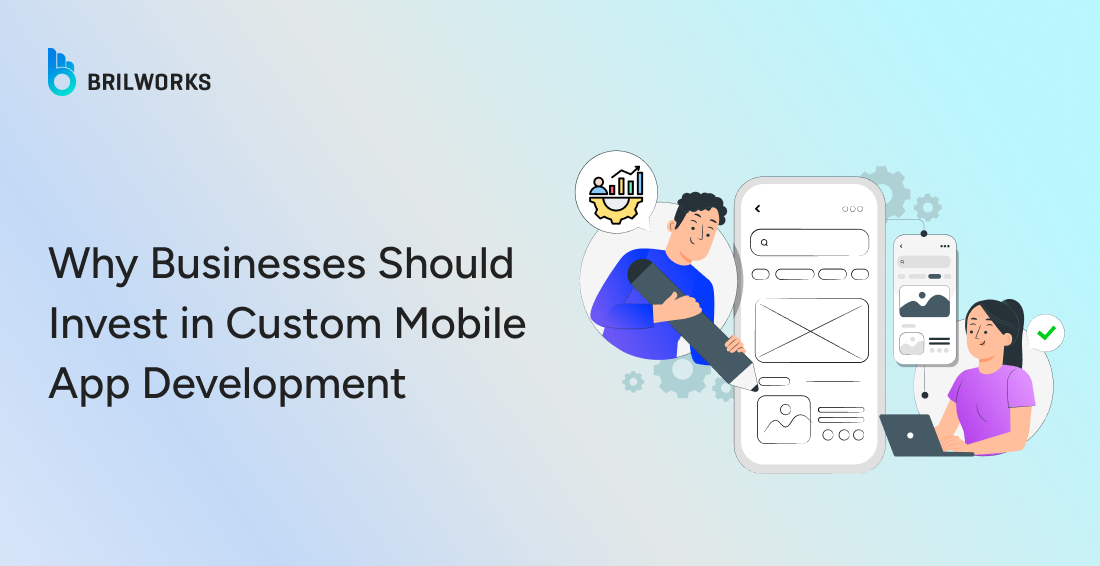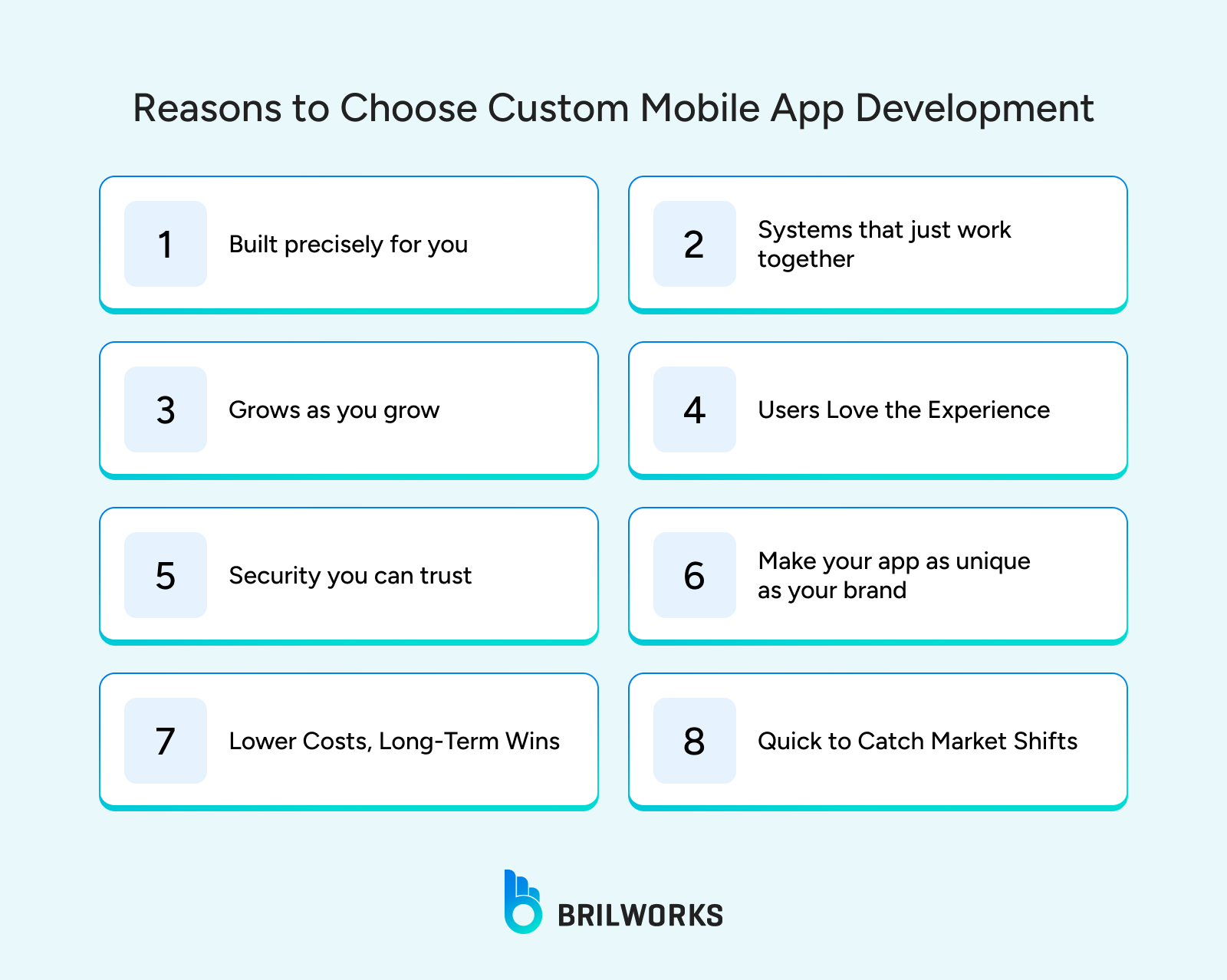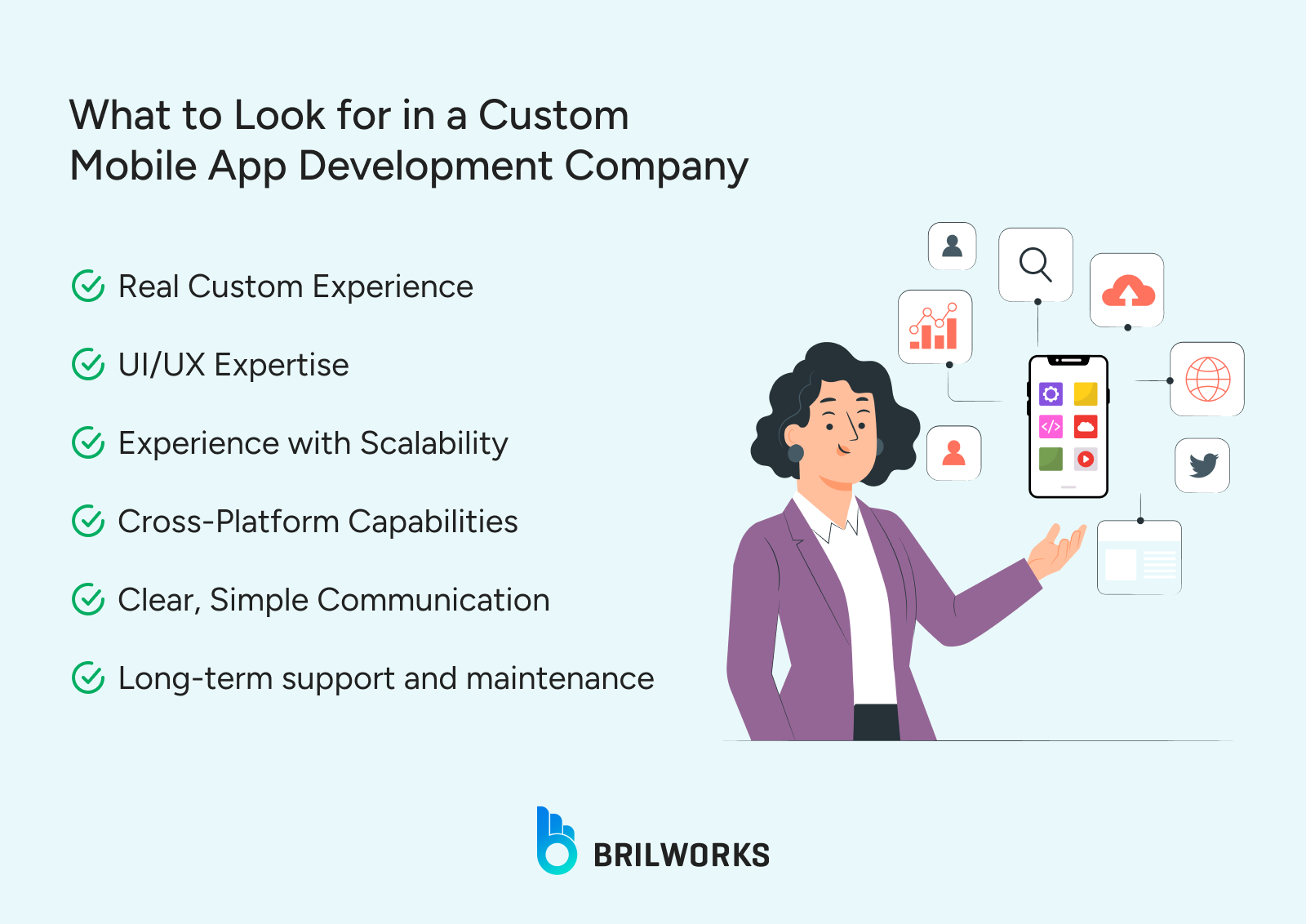COOPERATION MODEL
ARTIFICIAL INTELLIGENCE
PRODUCT ENGINEERING
DevOps & Cloud
LOW-CODE/NO-CODE DEVELOPMENT
INDUSTRY
FRONTEND DEVELOPMENT
CLOUD DEVELOPMENT
MOBILE APP DEVELOPMENT
LOW CODE/ NO CODE DEVELOPMENT
EMERGING TECHNOLOGIES








Consider how frequently you use your phone every day for banking, booking, shopping, and even education. Imagine now that your company has the same accessibility and ease of use that mobile apps provide. The problem is that not all apps are made equally.
Custom mobile app development can be a game-changer for companies trying to expand, make an impression, and establish a genuine connection with their clientele. A custom app is created around your needs, including your audience, workflows, and goals, rather than making your company adapt to generic tools.
Let’s turn towards the numbers to see the impact of custom mobile apps:
The global mobile app market is projected to hit $756 billion by 2027, growing at a CAGR of 8.58%. (Source)
The average smartphone user has 80 apps installed, but only uses 9 daily and about 30 monthly.
88% of mobile time is spent inside apps, not browsers.
Millennials are especially active — 70% play games daily, and 73% shop on their phones at least four times a week. (Source)
If you are planning to grow your business or you are wondering why you should invest in custom mobile apps, then this article might help you. We are a leading mobile app development company. In this article, we will answer most of your queries regarding mobile app development and whether or not you should have one.
Custom mobile app development is the process of designing, creating, and maintaining mobile applications tailored specifically to a business’s unique needs. Custom mobile apps are developed with your company's objectives, target market, and workflows in mind, in contrast to off-the-shelf solutions that provide a generic set of features.
The development process typically involves a few key stages:
Discovery & Planning - Understanding the business goals, target audience, and defining the app’s functionality.
Design - Crafting a user-friendly interface (UI) and ensuring a smooth user experience (UX).
Development - Building the app with your chosen technologies and frameworks.
Testing & QA - Ensuring the app is bug-free and runs smoothly across different devices and operating systems.
Launch & Maintenance - Releasing the app to users and providing ongoing updates and support.
The main benefit of custom development is that you get exactly what you need, with full control over the features and design. A custom mobile app is made to work for you, not the other way around, whether you need it for data management, internal business operations, e-commerce, or customer engagement. A custom mobile app development company specializes in creating these personalized solutions, leveraging expertise in coding, UI/UX design, and platform-specific technologies (like iOS and Android).

Off-the-shelf mobile apps (e.g., Microsoft Office Suite, Adobe Creative Cloud, Shopify etc) might seem like a quick fix, but they’re often a square peg in a round hole for businesses with big ambitions. Built for the masses, these generic apps can’t keep up with unique business needs, leaving you with clunky workarounds or missed opportunities. Custom mobile app development flips the script, giving you a tailored solution that’s as unique as your brand.
Let’s break it down with some pros and cons:
Lower upfront cost: These solutions usually come with a fixed price or subscription model, which feels more budget-friendly at first.
Quick to deploy: Since they’re already built, you can get started almost immediately.
User-tested: Widely-used apps have already been tested across many scenarios and often come with community support.
Limited customization: You can’t easily tailor features or design to match your brand or workflows.
Scalability issues: As your business grows, the app might not grow with you, leading to expensive workarounds or the need to switch platforms.
Generic user experience: Your app might look and feel like every other competitor using the same tool.
Integration challenges: Connecting to your existing tools or systems can be difficult or restricted.
Hidden costs: While upfront pricing is low, extra features, API access, or user seats can add up quickly.
Off-the-shelf software is best for organizations needing a quick, cost-effective solution for general business needs. However, it can become restrictive and costly as unique requirements emerge or as the business scales.

Currently, there are easily more than 5 million apps available. With innumerable apps, how will you make sure that your app stands out in that ocean? Whether you are booking a cab or ordering coffee, there’s probably already an app for it. That is why businesses choose to pursue custom app development. It provides flexibility and access to the vast majority of audiences.
It becomes more than just having an app. In custom development, you go through the process step-by-step and determine what you need and, more importantly, what your users need. Whether it’s cross-platform or for a specific OS? As you progress through, you keep finding answers to these types of questions. Custom mobile solution provides you with an app that works the way you work, serves your customers, and grows as you grow. Here’s what that actually looks like in practice:
Sometimes it’s wise to avoid being a “Jack of all trades.” Most ready-made apps try to be everything for everyone, which usually means they don’t really fit anyone perfectly. Because each business has something unique to offer to the audience.
Take, for example, a healthcare clinic. Let’s say your clinic provides specialized services like telemedicine, real-time health tracking, or patient management systems tailored to chronic conditions. A custom healthcare app can integrate these specific features directly into the app, giving patients a seamless experience to book consultations, track their health metrics, and communicate with their doctors in real time.
Because everything is built around your particular services and procedures, your app doesn't just work; it works the way you do, which makes things simpler for your patients and team.
Today, managing a business requires balancing numerous tools and systems. Technology is used for everything from inventory tracking to customer relationship management (CRM) software. Making sure that all of those systems communicate with one another without causing havoc is the difficult part.
Integration is simple with a custom app. Your app can be easily integrated with the tools that your company currently uses. There are countless options, such as connecting your app to the inventory of your eCommerce platform or integrating patient data from an electronic health record (EHR) system in a medical setting. Everything functions in unison rather than hopping between various systems and apps.
When you're starting a business, your app might be simple and easy to manage. But as your business grows, your needs change, and that includes how your app works. You might need new features, support for more users, or the ability to handle more data.
Rather than being stuck with an app that can only do a limited number of things, you can continuously add new functions, expand your reach, and keep up with any changes in your business model. It’s about building an app that doesn’t just work for now but is flexible enough to evolve as your business needs shift.
The key here is that scalability isn’t something you have to constantly think about later. It’s part of the design process from the start, so your app can keep supporting your business in the long term.
The user experience (UX) is everything. When people use your app, they should enjoy it. If it’s hard to navigate or doesn’t feel intuitive, they’ll quickly move on to something else.
With custom mobile app development, you get to design an experience that fits your users perfectly. From the layout to the features, everything can be tailored to how your audience interacts with your product or service. This means fewer frustrations and more satisfied users who are more likely to keep coming back.
In a world where people are quick to judge an app based on its design and usability, providing a smooth and enjoyable experience can set you apart from the competition. It’s all about making sure users feel like the app was made for them, not like they’re fitting into a mold that doesn’t quite work for them.
Security is a major concern when it comes to mobile apps, particularly if your app manages sensitive data like payment or personal information. Occasionally, security flaws in generic apps can expose your users. You can make sure that security is incorporated into every aspect of the app from the start with a custom mobile app.
With a custom app, you get full control, and you can follow the best security practices that are required. From data encryption to access controls, your app can be designed with the specific security needs of your industry in mind. Plus, you can ensure your app complies with industry regulations, like GDPR or HIPAA, which is crucial for businesses dealing with sensitive information.
If every business is using the same kind of app, how do you expect to stand out?
You can do things differently with custom mobile apps. Rather than following a predetermined template, you can build around what truly works for your company. This could be making your app feel more in line with your brand, personalising how users engage with your content, or providing a more seamless booking experience.
For example, A boutique fashion retailer might offer an app with an augmented reality (AR) feature for virtual try-ons, driving more conversions by creating a memorable, brand-centric experience.
It's not about making a big show. It all comes down to doing what suits you best, which frequently results in standing out without even trying.
The initial cost of developing a custom mobile app may seem high. However, if you zoom out a little, the long-term advantages frequently exceed the initial expenses.
When you use generic tools, you typically wind up paying for features you don't use or adding additional services to cover the gaps. That adds up over time. As your needs increase, you also have to spend more time (and money) figuring out how to get around restrictions, changing tools, or rebuilding things.
Businesses that can quickly adjust tend to have an advantage in fast-moving markets. You have an advantage in this situation with a custom mobile app.
It's much simpler to add new features or make changes because the app is made just for you. When it comes to reacting to client feedback, introducing a new service, or adapting to emerging market trends, you are not constrained by one-size-fits-all tools or waiting on outside vendors.
By now, you might have a clear idea of why so many startups and companies opt for custom mobile app development. In the app development process, so many things play a role. From functionality to interface, from selecting tech stack to deployment, you choose what goes in & out.
When an app is customised for your company, you avoid wasting time figuring out how to get around restrictions or paying for unnecessary features. Rather, you're spending money on something that complements your workflow, increases productivity, and maintains client engagement. It all adds up.
For example:
Better user experience means more satisfied customers, which often leads to repeat business and referrals.
Smarter internal processes save time, reduce manual errors, and let your team focus on high-impact work.
Data and insights gathered from your app help you understand what’s working—and where to focus next.
Since the app is yours, you can avoid ongoing license fees tied to third-party tools.

Not every app development company is created equal. Some people excel at creating basic apps fast, but you need a team with experience if you want to create something that truly fits your business and expands with it.
Here are a few important things to look for:
A team that has developed original mobile apps rather than merely reskinned templates is what you want. They ought to know how to create workflows, incorporate features from the ground up, and modify the app to meet your unique requirements.
Your app must be simple to use. Users will just quit using it if it is difficult to use or confusing. User flow, screen layout, and even minor details like button placement and load times are all carefully considered by a competent development company. Instead of merely hiring developers with coding skills, look for a team with true design expertise.
The size of your company will change over time. You must consider that when developing your app. As you expand, the right organisation will plan ahead and build a framework that can accommodate more users, features, and data.
Unless you’re building something highly specialized, you’ll likely want your app to work on both Android and iOS. A company with experience in cross-platform frameworks like React Native or Flutter can help you get there faster without doubling your budget. It also means updates can be rolled out to both platforms at the same time.
It shouldn't be necessary to follow up with your development team to get updates. An excellent business is transparent about difficulties or delays, keeps you updated, and explains technical concepts in easy-to-understand terms. Observe their communication style during the initial calls; it typically indicates how they will behave throughout the project.
The story doesn't end with the launch of an app. Later on, you'll require updates, bug fixes, and perhaps even new features. To avoid being left in a bind if something breaks or the market shifts, choose a team that provides long-term support. Consider the ongoing maintenance plans that some businesses provide.
In conclusion, developing a custom mobile app involves more than just writing code. It all comes down to designing something that is ideal for your company, including the features you require and how your users engage with it. It allows you the flexibility to scale as your company expands and create for your unique objectives.
At Brilworks, we’ve helped businesses across industries build custom apps that solve real problems and drive real results. From designing for scale to making sure everything runs smoothly across platforms, we bring the experience, technical skill, and long-term support you need to move forward with confidence.
We can assist you if you're considering creating an app that accurately represents your company—one that is distinctive, expands with you, and performs.
Custom mobile app development is the process of creating a mobile application tailored specifically to a business's unique needs, goals, and target audience, unlike generic, off-the-shelf solutions.
Custom apps offer greater flexibility, better user experience, scalability, and tailored features that fit your business, while off-the-shelf apps often require compromises.
The timeline for custom mobile app development varies depending on the app's complexity, features, and design. Typically, it can take anywhere from a few months to over a year.
Yes, one of the key benefits of custom app development is the ability to seamlessly integrate with your existing systems, ensuring smooth workflows and data exchange.
Absolutely. Custom apps are designed to grow with your business, improve customer engagement, enhance security, and provide a unique, competitive advantage that off-the-shelf solutions can’t match.
Get In Touch
Contact us for your software development requirements
Get In Touch
Contact us for your software development requirements